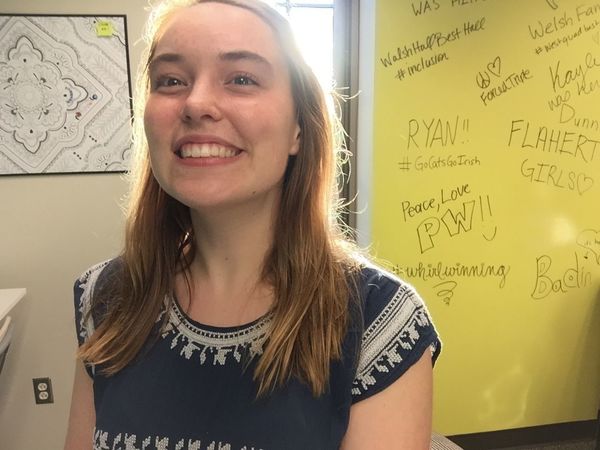Theology is a Continuous Process of Inquiry
The University Requirement for Theology
All Notre Dame undergraduate students are introduced to the practice of theology as faith seeking understanding through a two-course sequence.
 Natalie Boyce '19, Science PreProf and Supplementary Theology Major
Natalie Boyce '19, Science PreProf and Supplementary Theology Major
"My first theology class here took away my misconceptions about what studying theology is all about.
Think way, way beyond rote religious instruction. These classes are relevant to anyone who wants to work towards a greater understanding of who God is and how he relates to us.
I was continually drawn back to the study of theology by the professors' love of the subject and their care for their students' edification.
Study theology! I'd love to have you join me!"
First Theology Requirement: Foundations (THEO / WKFT)
The first course in theology isfoundational. Each course which fulfills this requirement will meet the following learning goal: Students will become familiar with the foundation of the mode of inquiry represented by theology.
Courses that fulfill the foundation requirement focus on what Vatican II states to be the "permanent foundation" of theology: "the written Word of God taken together with sacred tradition," i.e. Scripture and Tradition.
Objective: Scripture, Tradition, Revelation
Students will be able to define and explain what Scripture, Tradition, and revelation are. They will also be able to recognize and appreciate ways in which Scripture and Tradition interrelate in the transmission of revelation, as well as the categories and methods by which theology seeks to understand this transmission.
This will include being able to identify and appraise the culturally and historically conditioned modes in which both Scripture and Tradition transmit divine revelation, as well to appreciate how this transmission occurs in and through this very mediation.
Objective: Elements of Scripture and Tradition
Achieving the first objective requires working toward a second.
Students will be able to explain and interpret a significant cross-section of major elements of the content of Scripture and Tradition.
Three ways
This could be done in one of three ways:
(a) a survey of Scripture and of its interpretation and reception in the Tradition of the Church, especially the period of the first four ecumenical councils (First Nicaea in 325; First Constantinople in 381; First Ephesus in 431, and Chalcedon in 451);
(b) an investigation of the person and significance of Jesus Christ that is both scripturally grounded and examines the reception and development of the Scriptural witness in the ongoing Tradition;
(c) an introduction to the Catholic faith as a coherent whole arising from Scripture and Tradition as received by the Church.
Second Theology Requirement: Doctrine in Development and Dialogue (THE2 / WKDT)
Each course that fulfills this requirement will meet the following learning goal: Students will understand and appreciate how theology, as reflection on a living Tradition, is at once and inseparably both doctrinal and dialogical.
Objectives
In addition, each course that fulfills this requirement will meetone of the following two learning objectives:
Students will acquire in-depth knowledge of at least one historically significant, characteristic doctrine of the Christian faith and develop a heightened appreciation for the way doctrine develops as questions and insights from culture prompt a search for "understanding."
In other words, students will demonstrate both knowledge of the core teaching on the doctrine and the ways in which articulation and understanding of the doctrine have developed in the give and take from questions that arise as culture and history change.
Courses that fulfill the requirement under this rubric will focus on the dynamic of continuity and discontinuity in the articulation of doctrine even as they teach the content of the doctrine. In the process, students will learn, at a level of greater depth, to think in theological categories and to appreciate how these categories are distinctively theological.
Examples
Examples: Theology of God, Theology of Grace, Fundamental Theology, Sin and Redemption, Theology of Creation, Liturgy and Sacraments, Catholic Social Teaching, Mary in Catholic Theology, Theology of Ecumenism, Preferential Option for the Poor.
Students will acquire in-depth knowledge on an issue or perspective in which theology engages the doctrines of the faith in dialogue. Courses that fulfill the requirement under this rubric include, for example, theology and science, theology and evolution, comparative theology, theology and literature, theology in dialogue with another religion, theology of inculturation, theology encountering atheism. In the process, students will learn, at a level of greater depth, to think in theological categories and to appreciate how these categories are distinctively theological, promoting a "seeking for understanding" that respects and engages the Christian faith as well as the questions people actually bring to that faith as it is lived in engagement with the world.
lakethishembled1983.blogspot.com
Source: https://theology.nd.edu/about/the-university-requirement-for-theology/
0 Response to "Theology is a Continuous Process of Inquiry"
Postar um comentário